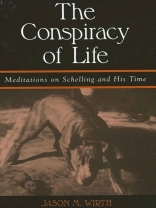Puts Schelling in conversation with twentieth-century continental philosophy.
The Conspiracy of Life offers a series of meditations on the philosophy of F. W. J. Schelling (1775–1854), a great-and greatly neglected-philosopher of life. Rather than construing him as a loopy mystic, or as an antiquated theologian, Jason M. Wirth attempts to locate Schelling as the belated contemporary of thinkers like Heidegger, Derrida, Bataille, Irigaray, Foucault, Deleuze, Levinas, and many others. As such, Schelling is already at the central nerve of current discussions concerning the crisis of truth; the primacy of the Good; the ecstatic nature of time; the nature of art; deep ecology; the world as an aesthetic phenomenon; comparative philosophy; the possibility of non-dialectical philosophy; radical evil; the haunting of philosophy; and the possibility of a philosophical religion.
Зміст
Introduction
1. The Nameless God
2. Theos Kai Pan
3. Nature
4. Direct Experience
5. Art
6. Evil
7. The Haunting
8. Purusottama
Notes
Bibliography
Index
Про автора
Jason M. Wirth is Professor of Philosophy at Seattle University. He is the author of Schelling’s Practice of the Wild: Time, Art, Imagination and The Conspiracy of Life: Meditations on Schelling and His Time; the translator of The Ages of the World by F. W. J. Schelling; and the coeditor (with Patrick Burke) of The Barbarian Principle: Merleau-Ponty, Schelling, and the Question of Nature, all published by SUNY Press.












